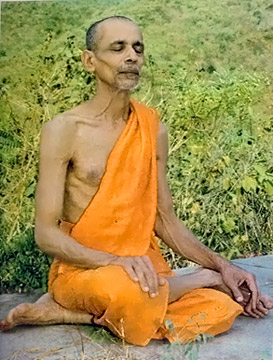 Early life of Swami Chidananda Saraswati was filled with love for service to the needy and inclination towards spiritualism. He was born to Srinivasa Rao and Sarojini on the 24th of September, 1916. He was the second among the five children and the eldest son of the family. His father, Sri Srinivasa Rao was a wealthy Zamindar who possessed lots of villages, extensive lands and buildings in south India. His mother Sarojini was an ideal woman, reputed for her saintliness. At the age of eight, the life of Sridhar Rao (as Swami Chidananda was called before he became a sanyasi) was shaped by Sri Anantayya, a friend of his grandfather, who narrated him stories from the great epics of Mahabharata and Ramayana.
Early life of Swami Chidananda Saraswati was filled with love for service to the needy and inclination towards spiritualism. He was born to Srinivasa Rao and Sarojini on the 24th of September, 1916. He was the second among the five children and the eldest son of the family. His father, Sri Srinivasa Rao was a wealthy Zamindar who possessed lots of villages, extensive lands and buildings in south India. His mother Sarojini was an ideal woman, reputed for her saintliness. At the age of eight, the life of Sridhar Rao (as Swami Chidananda was called before he became a sanyasi) was shaped by Sri Anantayya, a friend of his grandfather, who narrated him stories from the great epics of Mahabharata and Ramayana.
Swami Chidananda`s ideals from his childhood were to perform Tapas (austerities), become a Rishi or sage, and possess a vision of the Lord which he cherished. Krishna Rao, his uncle, saved him from the bad influences of the mundane world, and fired in him the desire of the Nivritti or life of renunciation, which Chidananda happily nurtured until it flowered into sainthood.
The elementary education of Sridhar was started at Mangalore. In the year 1932, he got admitted in the Muthiah Chetty School in the city of Chennai where he proved to be a brilliant student and became the favourite of all. His personality, code of conduct and extraordinary attributes gave him a special place in the heart and soul of all the students and teachers who were in contact with him. In the year 1936, he got admission to the Loyola College, and in 1938, he secured the Bachelor of Arts degree.
Swami Chidananda Saraswati`s family was reputed for its high code of conduct which was imbibed by him from his early childhood. Charity and service were the main virtues of all the members of his family and these virtues of nobility found a perfect shape in the life of Sridhar Rao. He discovered several ways to demonstrate them. Sridhar seldom refused to offer help to anyone who asked for it. He gave away freely to the poor and the needy. Early in life, although he was born in a wealthy family, he denounced the pleasures of the physical world and devoted himself entirely to contemplation and seclusion. He studied spiritual books which appealed him the most, even more than his college books. The works of Swami Vivekananda, Ramakrishna, Mahatma Gandhi, and Swami Sivananda Saraswati took much priority over all others.
Swami Chidananda shared his wisdom with others so much that he almost became the Guru of the household and of the neighborhood, with whom he would talk of honesty, purity, devotion, love and service to God. He would press them to do Japa or chanting of the name of Rama. While in his twenties, Swamiji began instigating youngsters into this famous Rama Taraka Mantra. He was a great admirer of Sri Ramakrishna Math at Chennai and on a regular basis participated in the Satsangs there. Swami Vivekananda`s call to renounce reverberated within Swami Chidananda`s pure heart. He always desired for the Darshan or vision of Sadhus and saints who visited the metropolis.




















